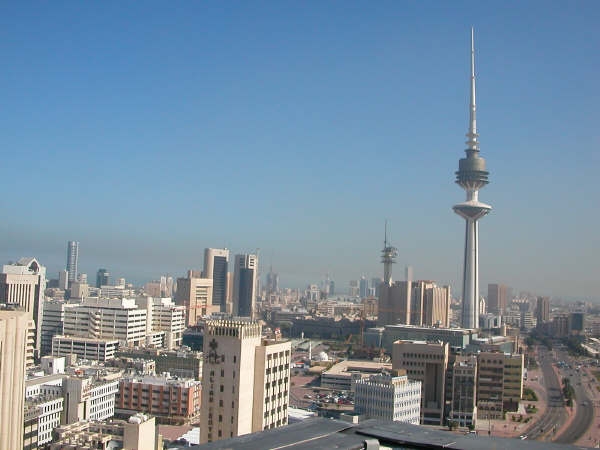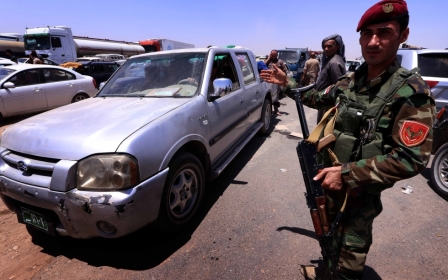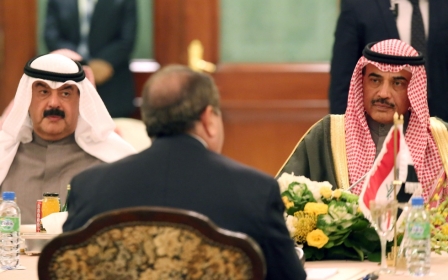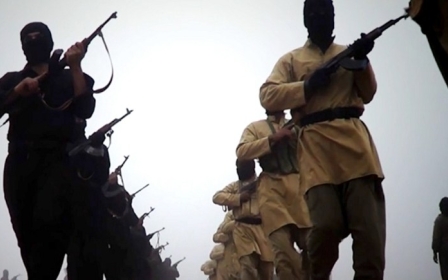Kuwait on alert over ISIL territorial gains in Iraq

Battles in the north of Iraq pitting Sunni fighters against the Shiite-led government are sending tremors of fear across the country's southern borders which, less than three decades ago, funnelled troops that invaded Kuwait's oil-rich soil.
The smaller neighbour, still reeling from the environmental, social and economic impacts of its 7-month annexation by Iraq in 1990-1991, is living a fresh concern as the Islamic State in Iraq and Levant (ISIL), an Al-Qaeda-inspired group, fights its way in Syria and Iraq to create its own caliphate.
According to a map released last week by the group, the state includes Kuwait.
"There is a real feeling of danger and threat among Kuwaitis, and a strong sense of alarm was triggered by the map," Abdullah Al-Shayji, former chairman of the political science department at Kuwait University, told Middle East Eye. "This topic has overshadowed any domestic issue in the country."
When news broke of ISIL advances in Iraq, an Arabic hashtag called #ISIL_on_Kuwaiti_Borders was started on Twitter. "Saddam Hussein completed that task in half an hour. Can ISIL break that record?" read one of the tweets.
"We have had a massively devastating experience with the occupation, and we must have - should have - learned from that lesson," al-Shayji said.
During the brief occupation, around 600 oil wells were set ablaze, causing environmental destruction from which the country still suffers, and massive economic reparations that have taken decades to settle. The horror of losing their home forever has scarred the Kuwaiti identity.
Days-long battles are ongoing between government troops and ISIL fighters over the Baiji oil refinery, 180km north of Baghdad, with both parties claiming control of the country's biggest oil facility.
Regional threat
In comments to Kuwait's Al-Seyassah newspaper, Defence Minister, Sheikh Khaled Al-Jarrah said the state is "monitoring the situation and is ready, in terms of security and military, to confront any developments whether internally or on its borders." He did not provide further information on these preparations.
Some argue that, however, "Kuwait has virtually no indigenous capability of holding off an ISIL advance," Professor Christopher Davidson, a specialist in Gulf affairs at Durham University, told Middle East Eye.
The state's foreign minister undersecretary, Khaled Al-Jarallah told reporters last week that "ISIL does not only target Kuwait, but the whole region," citing the circulating map as solid proof. "We have to act well on the level of security coordination, in a way that fortifies our domestic front and that of the Gulf Cooperation Council," he said.
Out of the six-member council, only Saudi Arabia and Kuwait share borders with Iraq. Other members include Oman, Bahrain, Qatar and the United Arab Emirates, and together, they hold about 45 percent of the world's proven oil reserves as well as 25 percent of its crude oil exports.
Earlier this year, Kuwait's parliament postponed a vote on a GCC security pact. Opponents of the pact, which obliges signatories to extradite anyone accused of plotting against a member state, fear it would undermine constitutional freedoms and raise the spectre of a police state in a country known for being relatively dissent-tolerant.
The agreement also allows states to intervene militarily to assist GCC governments in quelling unrest.
Kuwait, which refused to join a similar pact in 1994 for constitutional reasons, remains the only GCC member not to join the security agreement that was specifically modified to fit its charter.
But with the imminent threat looming next door, analysts say this could change.
According to Davidson, a "side effect of the ISIL offensive is that it will place pressure" on Kuwait to "sign up to the Saudi/UAE vision of a greater GCC security pact," adding that if the extremist group "makes some stabs into Kuwaiti territory, it would become difficult for the Kuwaiti parliament to keep debating/resisting this greater GCC unity."
"Should any actual threat to Kuwait develop, then the GCC security collective will kick in," Kristian Coates Ulrichsen, the Baker Institute fellow for Kuwait, said. "It may well be that it is the threat from ISIL that stimulates the closer coordination on internal security, that is called for by the security pact that Kuwait has not ratified."
Sectarianism
With the Iraqi crisis stemming from Sunni and Kurdish Iraqis accusing Al-Maliki's cabinet of exclusive practices, sectarian tension is feared to spike in Kuwait, where around 30 percent of its citizens are Shiite. Kuwait's population is less than 4 million, of which around two thirds are expatriates.
"The spill-over effect of the unrest in Iraq does not stop at the violence and bombing, but can also be in the form of sectarian strife," al-Shayji said.
Hints of such tension have already surfaced. Tens of Kuwaiti Shiites, including former lawmakers, staged a protest on 21 June in front of a newspaper in Kuwait City, after it carried an op-ed by Jordan's Former Minister of Information Saleh Al-Qallab, in which he criticized the Iraqi Shiite cleric Ayatollah Al-Sistani.
The country has witnessed contained bouts of sectarian tensions in recent years, the last of which was in 2011. Shiite protesters rallied in Bahrain against the Sunni rulers as mass demonstrations swept the Middle East, demanding political reform, prompting GCC troops, including the Kuwaiti army, to assist with quelling the protesters. Shiite Kuwaitis rallied in objection.
"Despite rising tensions, I don't see rising sectarianism in Kuwait, as national identity is pretty strong - much stronger than in Iraq - and the Shiite population are very integrated into society," Davidson said.
US and Iran
Any threat endangering the security of Kuwait, a potent ally of the US and host to a major military camp, will surely call for the US to step in, as it did in the 1990 invasion.
"Kuwait will be relying on the presence of US infantry bases to act as a disincentive to the group," Davidson said.
The US has also planted at least two other key military bases in the Arab Peninsula, specifically in Qatar and Bahrain, as they neighbour its long-time arch-foe, Iran. US airfields also dot the region.
But as Iran took on a recent twist in its foreign policies and its approach towards a contentious nuclear program, much of the hostility that strained its ties with the US were undone. This has, in exchange, strained ties between the US and its long-time ally, Saudi Arabia, the Sunni powerhouse that eyes Iran as a threat.
It is still unclear how sharing the same enemy, ISIL, will affect Iran - the US ties, as the group captures more strongholds and oil spoils and becomes the wealthiest Sunni-jihadist group ever to exist.
A 14 June statement by Iran's President Hassan Rouhani, in which he said a joint military act in Iraq with Washington to counter ISIL's offensives is being weighed, was overturned nine days later by the country's Supreme Leader Ayatollah Ali Khomeini. He warned against US intervention in war-torn Iraq.
"The situation is dynamic and is evolving quickly," said al-Shayji who described a rapprochement between the US and Iran over Iraq's crisis as a "dismay to the GCC."
The Islamic republic, along with Iraq's government, accuse Saudi Arabia and Qatar of financing armed fighters in their war against Bashar Al-Assad and Nouri Al-Maliki, while Kuwaiti citizens have reportedly been accused of doing the same.
"I advise Muslim countries that support the terrorists with their petrodollars to stop," Rouhani was quoted as saying by the website of Iran-run broadcaster on 14 June. "Tomorrow you will be targeted by these savage terrorists. Wash your hands of the killing of Muslims," he said, without naming the countries. Previous accusations levelled against the Sunni monarchies were more frank.
Al-Shayji described these statements, and similar ones made during to Kuwait's Emir Sheikh Sabah Al-Ahmed Al-Sabah to Tehran earlier this month, as "condescending and ridiculous." He blamed Iran and al-Maliki for fuelling sectarian rivalries that paved for the incumbent crisis.
Ulrichsen sees these funds from Kuwait is what threatens its security.
"So long as ISIL is confined to western and northern Iraq, it is not an immediate threat to Kuwait. However, the flows of funding and support from Kuwait and other Gulf States to varying shades of opposition groups in Syria does inject the possibility of unanticipated blowback, and this will be causing some concern among authorities," Ulrichsen said.
This possibility necessitates an urgent meeting by GCC officials to "iron out its preparations for all options," al-Shayji said, adding that the "least pressing of a set of worrisome possibilities is a Shiite state on the northern borders of Saudi and Kuwait. There has to be a meeting to discuss how this will be dealt with."
New MEE newsletter: Jerusalem Dispatch
Sign up to get the latest insights and analysis on Israel-Palestine, alongside Turkey Unpacked and other MEE newsletters
Middle East Eye delivers independent and unrivalled coverage and analysis of the Middle East, North Africa and beyond. To learn more about republishing this content and the associated fees, please fill out this form. More about MEE can be found here.




